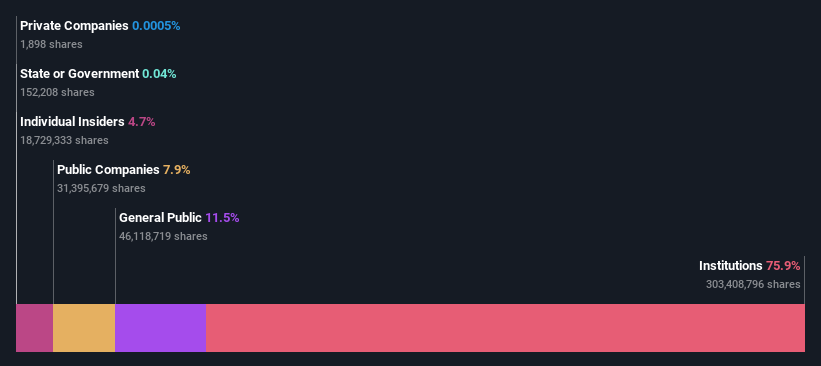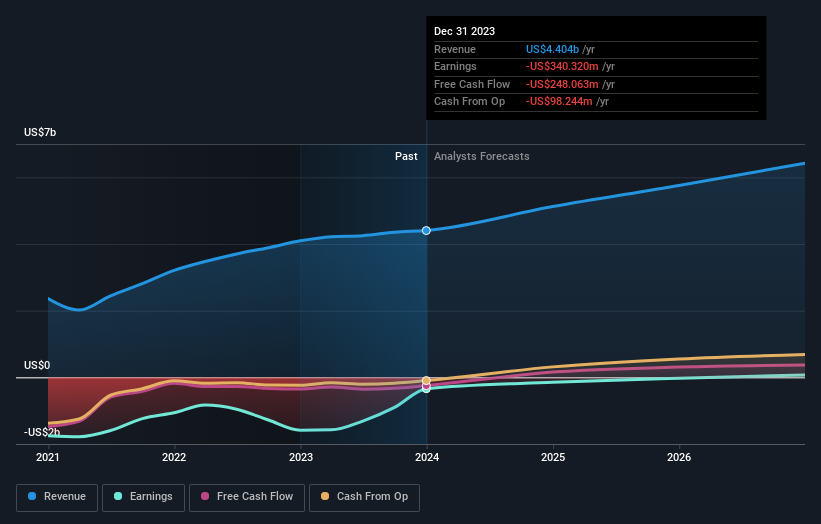Stock Analysis
- United States
- /
- Transportation
- /
- NasdaqGS:LYFT
Institutional investors may overlook Lyft, Inc.'s (NASDAQ:LYFT) recent US$256m market cap drop as long-term gains remain positive

Key Insights
- Institutions' substantial holdings in Lyft implies that they have significant influence over the company's share price
- The top 11 shareholders own 50% of the company
- Insiders have sold recently
Every investor in Lyft, Inc. (NASDAQ:LYFT) should be aware of the most powerful shareholder groups. And the group that holds the biggest piece of the pie are institutions with 76% ownership. That is, the group stands to benefit the most if the stock rises (or lose the most if there is a downturn).
Losing money on investments is something no shareholder enjoys, least of all institutional investors who saw their holdings value drop by 3.8% last week. However, the 58% one-year return to shareholders may have helped lessen their pain. But they would probably be wary of future losses.
Let's delve deeper into each type of owner of Lyft, beginning with the chart below.
Check out our latest analysis for Lyft

What Does The Institutional Ownership Tell Us About Lyft?
Many institutions measure their performance against an index that approximates the local market. So they usually pay more attention to companies that are included in major indices.
We can see that Lyft does have institutional investors; and they hold a good portion of the company's stock. This implies the analysts working for those institutions have looked at the stock and they like it. But just like anyone else, they could be wrong. It is not uncommon to see a big share price drop if two large institutional investors try to sell out of a stock at the same time. So it is worth checking the past earnings trajectory of Lyft, (below). Of course, keep in mind that there are other factors to consider, too.

Investors should note that institutions actually own more than half the company, so they can collectively wield significant power. Lyft is not owned by hedge funds. Looking at our data, we can see that the largest shareholder is FMR LLC with 14% of shares outstanding. With 8.0% and 7.9% of the shares outstanding respectively, The Vanguard Group, Inc. and Rakuten Group, Inc. are the second and third largest shareholders. Additionally, the company's CEO John Risher directly holds 1.5% of the total shares outstanding.
Looking at the shareholder registry, we can see that 50% of the ownership is controlled by the top 11 shareholders, meaning that no single shareholder has a majority interest in the ownership.
Researching institutional ownership is a good way to gauge and filter a stock's expected performance. The same can be achieved by studying analyst sentiments. There are a reasonable number of analysts covering the stock, so it might be useful to find out their aggregate view on the future.
Insider Ownership Of Lyft
The definition of company insiders can be subjective and does vary between jurisdictions. Our data reflects individual insiders, capturing board members at the very least. Company management run the business, but the CEO will answer to the board, even if he or she is a member of it.
Most consider insider ownership a positive because it can indicate the board is well aligned with other shareholders. However, on some occasions too much power is concentrated within this group.
Our most recent data indicates that insiders own some shares in Lyft, Inc.. It is a pretty big company, so it is generally a positive to see some potentially meaningful alignment. In this case, they own around US$301m worth of shares (at current prices). Most would say this shows alignment of interests between shareholders and the board. Still, it might be worth checking if those insiders have been selling.
General Public Ownership
With a 12% ownership, the general public, mostly comprising of individual investors, have some degree of sway over Lyft. While this group can't necessarily call the shots, it can certainly have a real influence on how the company is run.
Public Company Ownership
Public companies currently own 7.9% of Lyft stock. This may be a strategic interest and the two companies may have related business interests. It could be that they have de-merged. This holding is probably worth investigating further.
Next Steps:
It's always worth thinking about the different groups who own shares in a company. But to understand Lyft better, we need to consider many other factors. For instance, we've identified 3 warning signs for Lyft that you should be aware of.
But ultimately it is the future, not the past, that will determine how well the owners of this business will do. Therefore we think it advisable to take a look at this free report showing whether analysts are predicting a brighter future.
NB: Figures in this article are calculated using data from the last twelve months, which refer to the 12-month period ending on the last date of the month the financial statement is dated. This may not be consistent with full year annual report figures.
Valuation is complex, but we're helping make it simple.
Find out whether Lyft is potentially over or undervalued by checking out our comprehensive analysis, which includes fair value estimates, risks and warnings, dividends, insider transactions and financial health.
View the Free AnalysisHave feedback on this article? Concerned about the content? Get in touch with us directly. Alternatively, email editorial-team (at) simplywallst.com.
This article by Simply Wall St is general in nature. We provide commentary based on historical data and analyst forecasts only using an unbiased methodology and our articles are not intended to be financial advice. It does not constitute a recommendation to buy or sell any stock, and does not take account of your objectives, or your financial situation. We aim to bring you long-term focused analysis driven by fundamental data. Note that our analysis may not factor in the latest price-sensitive company announcements or qualitative material. Simply Wall St has no position in any stocks mentioned.
About NasdaqGS:LYFT
Lyft
Lyft, Inc. operates a peer-to-peer marketplace for on-demand ridesharing in the United States and Canada.
Reasonable growth potential and fair value.

